| Srl | Item |
| 1 |
ID:
104040
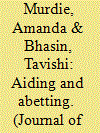

|
|
|
|
|
| Publication |
2011.
|
| Summary/Abstract |
This article studies the effects of human rights international nongovernmental organizations (INGOs) on domestic antigovernment protest. Unlike mainstream scholarship, the authors argue that human rights INGOs are not simply the magic bullet in orchestrating nonviolent protests; different types of human rights INGO activity have varying effects on protest. Moreover, some human rights INGO activities may lead to higher levels of violent protest. The empirical tests use new data on the activities of over 400 human rights INGOs and domestic nonviolent and violent protest globally from 1991 to 2004. The authors find that increases in human rights INGO activities reflecting a greater commitment to the domestic population are associated with higher levels of both violent and nonviolent protest.
|
|
|
|
|
|
|
|
|
|
|
|
|
|
|
|
| 2 |
ID:
104044
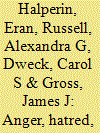

|
|
|
|
|
| Publication |
2011.
|
| Summary/Abstract |
Anger is often viewed as a destructive force in intergroup conflicts because of its links to aggressive behavior. The authors hypothesized, however, that anger should have constructive effects in those with low levels of hatred toward the out-group. Using experimental designs with subsamples of nationwide representative surveys, the authors conducted two studies within the context of the Israeli-Palestinian conflict. Study 1 showed that inducing anger toward Palestinians several weeks before the Annapolis summit increased support for making compromises in upcoming negotiations among those with low levels of hatred but decreased support for compromise among those with high levels of hatred. Study 2 showed that, even when a strong anger induction was used just days before the summit, the anger induction led to increased support for compromise among those low in hatred, but not among those high in hatred. The authors discuss the implications of these findings for informing a psychological understanding of conflicts.
|
|
|
|
|
|
|
|
|
|
|
|
|
|
|
|
| 3 |
ID:
104041
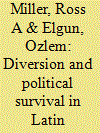

|
|
|
|
|
| Publication |
2011.
|
| Summary/Abstract |
In spite of its long history among scholars of international conflict, empirical evaluations of diversionary theory have produced contrasting-even contradictory- results. We offer three reasons for these differences: choice of unit of analysis; failure to model the reciprocal relationship between threats to the survival of political leaders on one hand, and international conflict participation on the other; and measurement error in operationalizations of the independent variable-the incentive of leaders to divert. We construct an empirical test that addresses all of these concerns. Our analysis of data from Latin America during the period 1960-99 reveals robust evidence in support of diversionary theory. The results also expose the biasing effects associated with the failure to control for reciprocal causation and measurement problems.
|
|
|
|
|
|
|
|
|
|
|
|
|
|
|
|
| 4 |
ID:
104042
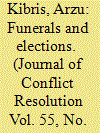

|
|
|
|
|
| Publication |
2011.
|
| Summary/Abstract |
This article empirically analyzes the effects of terrorism on the electoral choices of the Turkish voters in the 1991 and 1995 general elections. It relies on a unique data set that includes the date and the place of burial of Turkish soldiers and police officers who died in the fight against the terrorist organization PKK. The author uses the number of these security force terror casualties at the district level as a measure of the level of terrorism that the people of that district have been exposed to and analyzes whether and how exposure to terrorism affects people's electoral choices. The results indicate that Turkish voters are highly sensitive to terrorism and that they blame the government for their losses. Moreover, exposure to terrorism leads to an increase in the vote share of the right-wing parties who are less concessionist toward the terrorist organization's cause compared to their left-wing counterparts.
|
|
|
|
|
|
|
|
|
|
|
|
|
|
|
|
| 5 |
ID:
104045
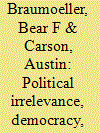

|
|
|
|
|
| Publication |
2011.
|
| Summary/Abstract |
Although the statistical literature on conflict studies has generated strong and consistent findings on the relationship of political irrelevance and dyadic democracy to conflict, scholars have paid scant attention to the interesting theoretical issue of how they matter. The authors argue that additive controls and dropping irrelevant dyads constitute misspecifications of their effects. There are theoretical reasons to believe that the impact of distance on conflict is not sufficiently severe to justify the practice of simply dropping irrelevant dyads. Moreover, they argue that political irrelevance and dyadic democracy, rather than subtracting some constant quantity, interact to impose an upper bound on the probability of conflict initiation. They find both of these arguments to be supported in a reanalysis of a prominent study of dispute initiation.
|
|
|
|
|
|
|
|
|
|
|
|
|
|
|
|
| 6 |
ID:
104043
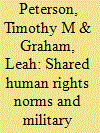

|
|
|
|
|
| Publication |
2011.
|
| Summary/Abstract |
The normative transfer thesis posits that systematic discrimination, inequality, and repression are indicative of violent norms within states, which extend to the realm of foreign policy. In this article, the authors contend that the pacifying influence of similarity conditions the impact of physical integrity norms at the dyad level. Although mutual norms of domestic nonviolence are more pacifying than mutual disregard thereof, the authors argue that a wide disparity in norms is more aggravating than shared violent norms. This follows because similarity of abusive norms may preclude certain conflicts of interest from originating. The authors test this argument on data from 1981 to 2001, finding that conflict initiation is more likely when states have disparate levels of respect for physical integrity rights. The authors find evidence for a conditional norm transfer, as mutually respectful dyads are least likely to experience conflict; however, they also find evidence of a somewhat weaker peace between abusers.
|
|
|
|
|
|
|
|
|
|
|
|
|
|
|
|